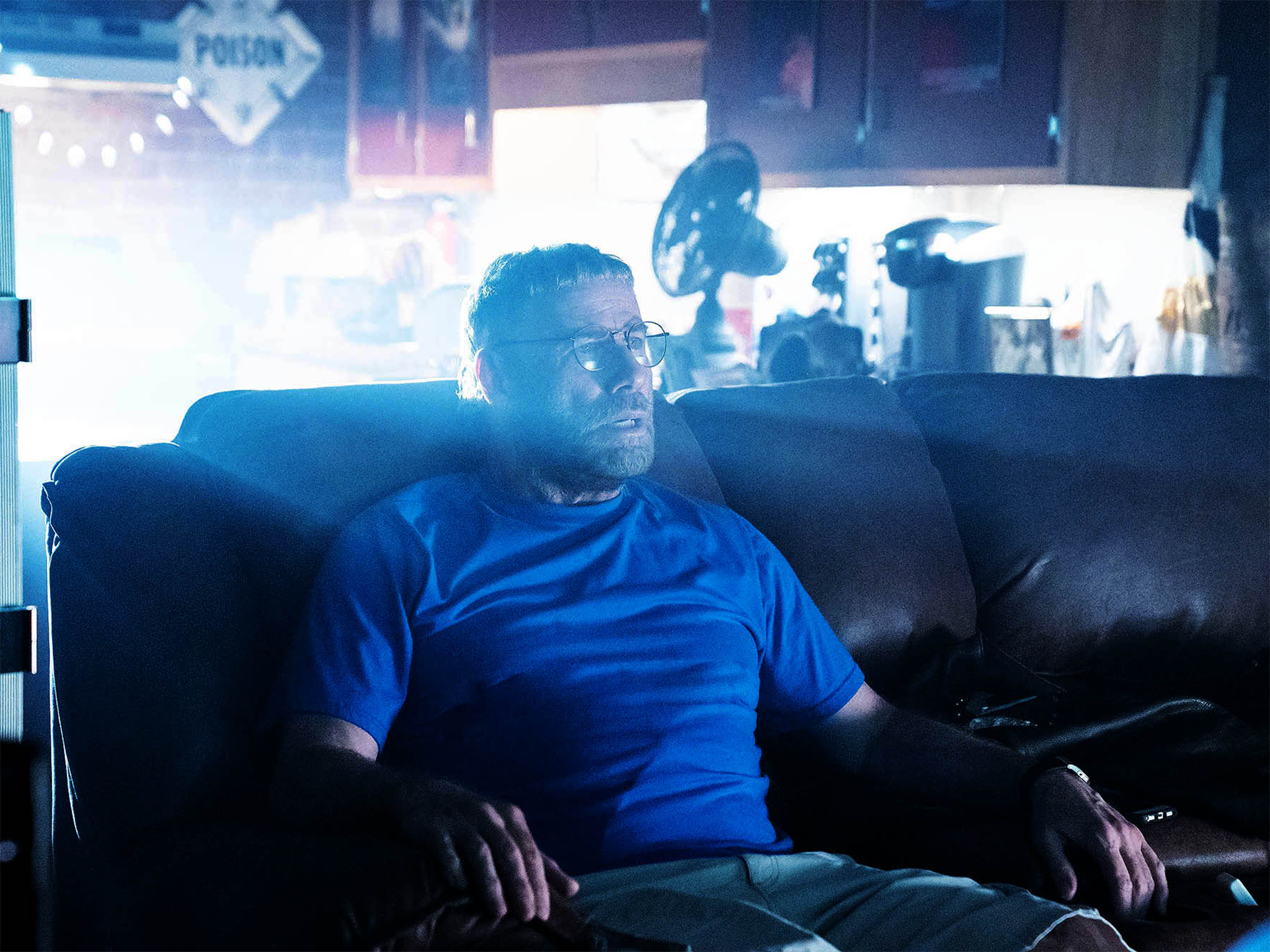John Travolta is living for smaller films despite the negative reviews and comments
Travolta is in his ‘no regrets’ stage of his career and enjoying every minute of it, says Sonia Rao

John Travolta paces a Georgetown hotel room on a mid-August morning, imitating the pronounced physicality of a few of his more recent characters. He highlights his versatility by switching from the long strides of Robert Shapiro, an attorney in the FX miniseries The People v. O.J. Simpson: American Crime Story, to the hesitant baby steps of Edna Turnblad, the protagonist’s anxious mother in the movie musical Hairspray. Satisfied with the demonstration, he eventually returns to the couch where he has been sipping an iced tea, specially requested with a slice of lemon.
Travolta points out that he is bald, a beauty decision inspired in part by the rapper Pitbull, whose music video the veteran actor, 65, recently appeared in – a random fact he volunteers to back his claim that he’s in the “no regrets” stage of his career. That’s not to suggest he’s playing it safe, as that has never been his forte. He’s just taking on the projects he’s always wanted to take on, marketability be damned.
Playing a racecar driver had long been on Travolta’s bucket list, he says, so when the opportunity arose with February’s Trading Paint, also starring Shania Twain, he seized it. Similar reasoning might have led him to accept the title role in last year’s crime drama Gotti, which stewed in development for nearly a decade and ultimately wound up with a zero-per cent rating on Rotten Tomatoes, based on 55 reviews.
Regardless of how his films have been received as of late, the passion with which Travolta takes on each role is palpable. The New Yorker critic Pauline Kael once praised his performance in Saturday Night Fever by writing that he “isn’t just a good actor, he’s a generous-hearted actor”, words he still holds close to his heart decades later. This generosity has most recently been granted to the lead character of The Fanatic, a movie about an avid fan-turned-stalker – a “stan” in the modern parlance – named Moose.
“I don’t mind watching people that have made a career out of being themselves, that’s just not my thing,” Travolta says of his varied roles. “It’s not even a fear of typecasting, it’s a fear of getting bored. If you don’t have that level of pleasure in your performance, people pick up on it. ‘Oh, he doesn’t want to be there, he’s phoning it in,’ whatever. I really love embracing the pleasure of it.”
There’s a lot to unpack with The Fanatic, beginning with the fact that it was directed by Limp Bizkit frontman Fred Durst, whom Travolta says is “a terrific actor, too, by the way”. The rap-rock band once famously incurred the wrath of Eminem, who in 2000 released the chart-topping track “Stan”, written from the perspective of an obsessed fan, which led to the creation of the slang term. The accompanying music video’s stan appears in the form of teen idol Devon Sawa, who also plays Hunter Dunbar, the action star Travolta’s character is obsessed with in, yup, The Fanatic.
Durst had apparently written the role of Moose with Travolta in mind, loosely basing the character off a real person who the actor says was on the disability spectrum to some degree. Travolta purposefully leaned into that characterisation as a way to “justify for the audience why he’s crossing the line”. It might be more accurate to say that Moose, a mistreated Hollywood street performer, leaps past the line – after Hunter abruptly ends a meet-and-greet before Moose has the chance to talk to his hero, Moose uses a paparazzo friend’s connections to start stalking Hunter, who eventually winds up tied to his own bed.

Travolta has been on the Hunter side of things twice before, once in Santa Barbara, California, many years ago and for a second time within the past decade. He says he wouldn’t place the “curious and naive” pair of home intruders in the “Moose category of invasion”, though, explaining that one of them had simply had too much to drink and that the other one was “just a scared girl”. Then, he pauses.
“Well, now that I think of it, they did go past the line. It’s just that I wasn’t tied up.”
Moose goes full Kathy Bates in Misery short of smashing Hunter’s ankles with a sledgehammer. Most of his actions were scripted, though Travolta says he was allowed to improvise quite a bit because Durst trusted that he knew exactly what Moose would say or do in any given situation. As the actor put it: “Improvisation is the cherry on the cake, you know. It’s not the cake. The script has to be the cake.”

Watch Apple TV+ free for 7 day
New subscribers only. £9.99/mo. after free trial. Plan auto-renews until cancelled.
ADVERTISEMENT. If you sign up to this service we will earn commission. This revenue helps to fund journalism across The Independent.

Watch Apple TV+ free for 7 day
New subscribers only. £9.99/mo. after free trial. Plan auto-renews until cancelled.
ADVERTISEMENT. If you sign up to this service we will earn commission. This revenue helps to fund journalism across The Independent.
The projected spontaneity of Travolta’s performances might be more akin to a thick layer of frosting than a mere cherry. He licked the side of someone’s face in Face/Off, for instance, after which he says the studio asked: “What is he doing?” Even with Pulp Fiction, Travolta says there was pushback on how slowly he walked and talked as Vincent Vega. It took Quentin Tarantino’s confidence to let Travolta do his thing, he says, and the studio eventually realised he was playing “the heroin high and low”.
Travolta explains his recent spate of smaller films including The Fanatic and Trading Paint by suggesting they allow actors, writers and directors a great deal more creative freedom.
“We couldn’t have done half the things we did with The Fanatic if a Big Brother had been watching over us,” he says. “Your Mike Nichols ... your Quentin Tarantino, your Robert Altman, those would be the guys who could trump the studio. But not everybody else. You either get in bed with the people who have the power, or if you can’t have that, the best thing is to have freedom within your choices.”
Having worked in the industry for nearly five decades, Travolta’s career can quite easily be separated into stages. There was his breakout role as a high school heartthrob in the sitcom Welcome Back, Kotter, which began to air in September 1975 and coincided with his playing a bully in Carrie the next year. His success peaked later in the decade with 1977’s Saturday Night Fever, which earned the twenty-something his first Oscar nomination, as well as the following year’s Grease.

The 1980s were rougher, filled with a string of critical and often commercial duds. It took Pulp Fiction in 1994 to revive his career, landing him a second Oscar nomination and triggering an onslaught of movie offers – among them, titles such as Get Shorty, Face/Off, Primary Colors and more. Then, in 2000, Travolta starred in and produced the universally panned sci-fi film Battlefield Earth, based on a novel by the Church of Scientology founder, L Ron Hubbard. The actor’s adherence to the practice has long courted controversy, but he continues to work steadily, if not always prominently.
Fame is a funny, fickle thing, as Travolta seems aware – after Danny Zuko, younger generations might very well describe him as the man who introduced singer Idina Menzel as “Adele Dazeem” at the Academy Awards several years ago. The way an actor’s fame operates in an era when entertainment has proliferated onto an ever-growing number of platforms is a “whole conversation”, Travolta says, but his general view is this: as a self-described “old-timer”, he benefits from having become famous at a time when it was more exclusive. It’s incredibly difficult to achieve that sort of ubiquitous fame nowadays because content, fandom and even notoriety are divided among subcategories.
“The luxury is that someone like myself, a Tom Hanks or a Tom Cruise, a Brad Pitt or a Leonardo DiCaprio, we are in a beautiful zone where, because we had this rarefied time where we could become globally famous, we can now parlay that into doing the bits we want, even if there’s only going to be a select audience,” he continues. “You get this wonderful luxury of being able to do the kinds of films you believe in, without waiting for someone to give them to you.”

Animated in his speech and demeanor, Travolta exudes a sense of optimism greatly lacking from The Fanatic, in which a narrator comments on Moose’s experience by saying that Hollywood can take the life out of a person. And yet the actor also finds that sentiment accurate, explaining that there is “a pretty wide spectrum” of how unethical or “two-faced” behaviour within the industry can bring people down.
“All of that can happen in a place where the stakes are high,” he laments. “If you put simple souls with innocent intentions in the middle of something that is so cynical – or potentially so cynical – you have this unfortunate juggernaut.”
The industry has never been as self-reflective as it is today thanks to movements such as #MeToo, Travolta says, though he believes that one is currently “in the confusion” state – an opinion he expands upon in a meandering spiel. “Even sexuality is used as a political leverage,” he explains, adding that everyone closely examining their own behaviour might simultaneously be “losing a global perspective”. He is careful not to express disapproval of the movement itself, but rather of the manner in which it has progressed.
“It’s like an engine – it’s right to start the engine, but no one’s letting off the accelerator,” he says. “Now you’ve got a runaway vehicle. Who knows what brings that into focus, where it’s actually, in relativity, looked at correctly, as opposed to any knee-jerk reaction to it? You’re on eggshells, don’t want to say the wrong thing, political correctness or incorrectness. Good, old-fashioned thought and steadfast logic is sometimes missing from these things.”
He takes another sip of iced tea, laughing: “I never expected to go there.”
© Washington Post
Join our commenting forum
Join thought-provoking conversations, follow other Independent readers and see their replies
Comments
Bookmark popover
Removed from bookmarks